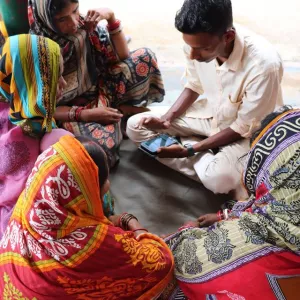Fostering Inclusive Adoption of RCM Through MDII Insights
by Niyati Singaraju, Shalini Gakhar A study of rice farmers in India and Indonesia through the MDII framework revealed barriers and opportunities for the adoption and inclusiveness of agricultural digital tools like Rice Crop Manager, particularly for women and marginalized farmers. In today’s digital age, farmers adopt innovative tools to make more informed decisions in agrifood systems. One such application

Fostering Inclusive Adoption of RCM Through MDII Insights
by Niyati Singaraju, Shalini Gakhar
A study of rice farmers in India and Indonesia through the MDII framework revealed barriers and opportunities for the adoption and inclusiveness of agricultural digital tools like Rice Crop Manager, particularly for women and marginalized farmers.
In today’s digital age, farmers adopt innovative tools to make more informed decisions in agrifood systems. One such application is the Rice Crop Manager (RCM), a web-based platform developed by the International Rice Research Institute (IRRI) and its partners. Launched in 2013, RCM offers field-specific crop and nutrient management recommendations, empowering farmers by helping boost yields and increase incomes.
In the Philippines, using RCM led to an average yield increase of at least 0.4 tons per hectare per crop, providing an additional net benefit of USD 100 per cropping season. In India, this impact was even more significant, with farmers achieving a yield increase of 0.5 tons per hectare, equating to an added net benefit of USD 150 per hectare per season. While these numbers demonstrate the tool’s potential, a key question remains: are its benefits reaching everyone, especially women and marginalized farmers?
To address this, we used the Multidimensional Digital Inclusiveness Index (MDII), a framework developed by CGIAR’s Digital Innovation Initiative, to evaluate the inclusiveness of RCM. The MDII framework examines barriers such as access, digital literacy, usability, and co-creation to identify ways to ensure that digital tools meet the diverse needs of all farmers.
We conducted evaluations in two distinct geographical contexts. First is in Odisha, India, where RCM has been operational since 2013; and second are in various regions in Indonesia, where an upgraded version of the tool, Layanan Konsultasi Padi (LKP) 2.0, is currently in the testing phase. These evaluations provided invaluable insights into the inclusivity challenges and opportunities associated with RCM.

